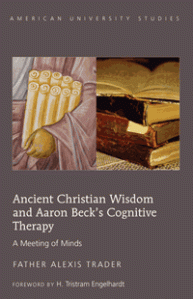Some Cognitive Strategies Behind “Making Excuses with Excuses in Sin”
In Ancient Christian Wisdom, I provide a table that indicates some of the ways that the eight deadly sins or passions also take to their service many of the twelve cognitive distortions that therapists try to correct in the process of cognitive therapy. For example, I mention the cognitive distortion of tunnel vision in which a person only sees the negative aspect of a situation. I note that that particular cognitive distortion is “observable primarily in anger, listlessness, and dejection, but also as an auxiliary factor contributing to gluttony, fornication, and avarice.” Removing tunnel vision by an outlook on life illumined by the love of God can certainly help enervate those passions, but that won’t win the battle. Still knowing something about those cognitive distortions can be a real help.
 Taking the relationship between cognitive distortions and the eight deadly sins as a starting point, I’d like to do something similar with the subject excuses, which we’ve spoke about in several blog posts. Just as there are cognitive distortions that are apparent in the eight deadly sins, so there are cognitive strategies present in making excuses. K. Pope relates in his book Ethics in Psychotherapy and Counseling: A Practical Guide, lists 21 cognitive strategies used by clinicians to justify unethical behavior “at a moment of terrible need, temptation, exhaustion, carelessness, narcissism, anger, lack of perspective, or confusion.” For this post, I would like to consider about 17 strategies from that list, but in the place of the word unethical, I’ll use the word sinful and in place of professional contexts, I’ll use the context that Christians face in their day-to-day life in the world. Reading the list might help us see if we excuse any of our sins in such ways, so that we can instead of an excuse, offer repentance and receive the sweet balm of forgiveness.
Taking the relationship between cognitive distortions and the eight deadly sins as a starting point, I’d like to do something similar with the subject excuses, which we’ve spoke about in several blog posts. Just as there are cognitive distortions that are apparent in the eight deadly sins, so there are cognitive strategies present in making excuses. K. Pope relates in his book Ethics in Psychotherapy and Counseling: A Practical Guide, lists 21 cognitive strategies used by clinicians to justify unethical behavior “at a moment of terrible need, temptation, exhaustion, carelessness, narcissism, anger, lack of perspective, or confusion.” For this post, I would like to consider about 17 strategies from that list, but in the place of the word unethical, I’ll use the word sinful and in place of professional contexts, I’ll use the context that Christians face in their day-to-day life in the world. Reading the list might help us see if we excuse any of our sins in such ways, so that we can instead of an excuse, offer repentance and receive the sweet balm of forgiveness.
So here’s one version of the excuse list. Many others are possible:
1) It’s not sinful, if most Christian denominations encourage it.
2) It’s not sinful, if I can’t find it in the Church Canons or local bylaws.
3) It’s not really sinful, if it’s not illegal.
4) It’s not all that sinful, if I can name other people who do the same thing.
5) It’s not sinful as long as I didn’t mean to hurt anyone.
6) It’s not sinful even if my acts have caused harm as long as the person I harmed had it coming, provoked me, deserved it, was really asking for it, or practically forced me to do it—or, failing that, has not behaved perfectly, is in some way unlikable, or is acting unreasonably.
7) It’s not all that sinful if I could not (or did not) anticipate the unintended consequences of our acts.
8) It’s not sinful if it was simply an error in judgment, completely inconsistent with the virtue manifest in every other part of my life and insignificant in the context of the unbelievable good that I do.
9) It’s not sinful if I can say any of the following about it:
“What else could I do?”
“Anyone else would’ve done the same thing.”
“It came from the heart.”
“I listened to my soul.”
“I went with my gut.”
“It was the smart thing to do.”
“It was just common sense.”
“Look, I was just stuck between a rock and a hard place.”
“I’d do the same thing again if I had it to do over.”
“I’m only human, you know!” “What’s the big deal?
10) It’s not that sinful as long as I was under a lot of stress. No fair-minded person would hold me accountable when it is clear that it was the stress I was under—along with all sorts of other powerful factors—that must be held responsible.
11) It’s not sinful as long as no one ever complained about it.
12) It’s not sinful as long as I know that people higher up in the hierarchy are dishonest, stupid, and destructive (This excuse is ironically also a sin).
13) It’s not sinful as long as it was for a worthy cause.
14) It’s not sinful, since I’m the real victim in the situation.
15) It’s not sinful as long as it would be almost impossible to do things another way.
16) It’s not sinful as long as there are books, articles, or blog posts claiming that such behavior is the right thing to do.
17) It’s not sinful as long as I can find some other member of the congregation, or better yet member of the clergy, who says its OK.



